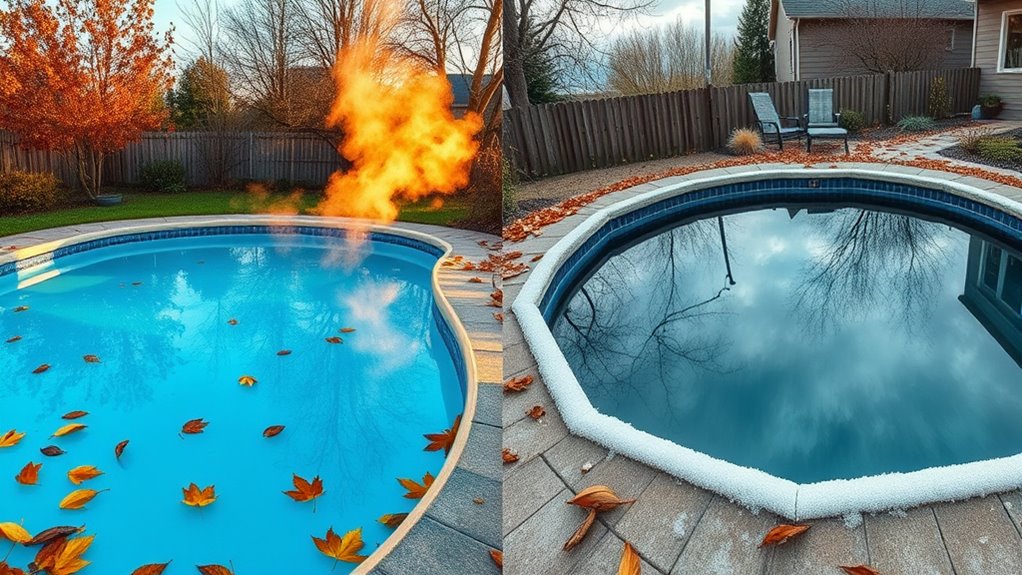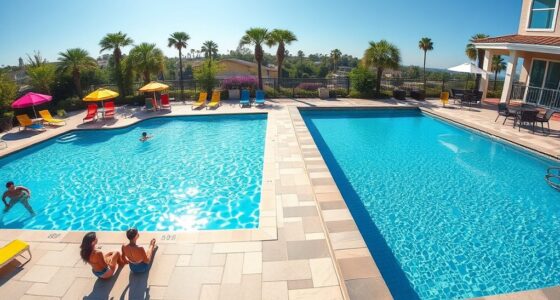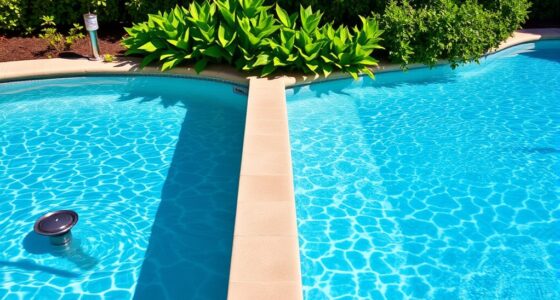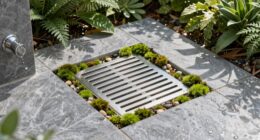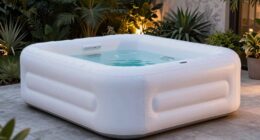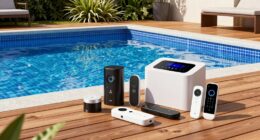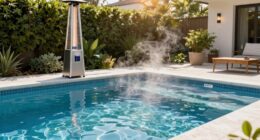Whether you need a pool heater depends on your climate, swimming plans, and budget. If you swim year-round or in cooler weather, a heated pool helps extend your season and guarantees comfort. For warmer climates or summer use, an unheated pool may suffice and save costs. Heating adds to energy bills and maintenance, so consider efficiency options like solar heaters. Keep exploring to discover which option suits your needs best.
Key Takeaways
- Heated pools allow swimming year-round or in cooler weather, while unheated pools are best for warm climates and summer use.
- Maintaining a heated pool requires regular equipment checks and higher energy costs, unlike the simpler upkeep of unheated pools.
- Consider local climate; heating extends swimming seasons in cooler areas but may be unnecessary in warm regions.
- Budget constraints favor unheated pools due to lower initial and ongoing expenses, though modern heaters can reduce costs.
- Solar heaters and efficient systems help offset energy costs, making heated pools more sustainable and cost-effective long-term.
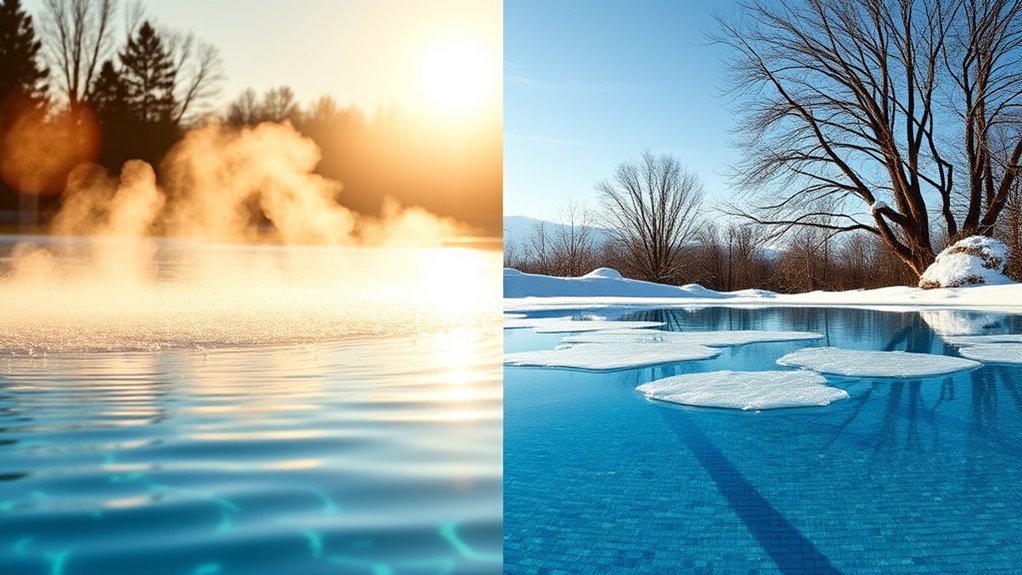
When choosing between heated and unheated pools, your decision depends largely on how and when you want to enjoy your swimming experience. If you prefer swimming year-round or during cooler months, a heated pool might be the best option. However, keep in mind that maintaining a heated pool involves more than just flipping a switch; it requires consistent pool maintenance to keep the equipment functioning properly and the water clean. Regularly inspecting your pool heater and filtration system ensures efficient operation, which can prevent costly repairs down the line. Additionally, pool maintenance impacts energy consumption, as heating systems tend to be energy-intensive. You’ll want to contemplate the ongoing costs of running a heater, especially if you plan to use the pool frequently.
On the other hand, unheated pools are simpler and generally cheaper to operate. They don’t require a heating system, so your energy consumption is considerably lower. This makes unheated pools an attractive choice if you’re budget-conscious or prefer a more natural swimming experience. In warm climates or during summer months, an unheated pool can be perfectly comfortable, allowing you to enjoy the water without added costs or technical concerns. Plus, since unheated pools require less equipment and fewer adjustments, your pool maintenance routine is simpler, reducing the likelihood of issues caused by complex systems.
However, if you live in a cooler climate or want to extend your swimming season, heating becomes more appealing. A pool heater can boost the water temperature to a comfortable level, enabling you to swim even when outdoor temperatures drop. While this convenience comes with increased energy consumption, modern heating systems are becoming more efficient, helping to reduce operational costs. You might also explore options like solar pool heaters, which harness renewable energy to warm your pool and lower your overall energy bills. These eco-friendly options can help balance your desire for comfort with the need to manage ongoing expenses. Moreover, understanding asset division laws can be especially important if you own the property with the pool, as it may impact ownership and maintenance responsibilities.
Frequently Asked Questions
What Is the Average Cost Difference Between Heated and Unheated Pools?
The cost comparison between heated and unheated pools varies considerably. You’ll find that heated pools often cost $20,000 to $50,000 or more, mainly due to installation expenses for the heater and insulation. Unheated pools are generally cheaper upfront, typically ranging from $10,000 to $30,000. Keep in mind, ongoing energy costs for heating can add to your total expenses over time, making the initial investment a key factor in your decision.
How Much Energy Does a Typical Pool Heater Consume Annually?
Think of your pool heater as a steady heartbeat, pulsing energy into your oasis. On average, a typical pool heater consumes about 1,000 to 2,000 kWh annually, depending on size and usage. This energy consumption impacts your cost efficiency, so choosing an efficient model can save you money. Regular maintenance also helps optimize performance, ensuring you enjoy warm swims without draining your wallet.
Can Unheated Pools Be Used Year-Round in Colder Climates?
In colder climates, you can still enjoy seasonal swimming in unheated pools if you invest in proper pool insulation. Insulation helps retain heat, extending your swimming season, but you’ll likely need to cover your pool when not in use to prevent heat loss. While year-round use may be challenging without a heater, good insulation can make unheated pools more comfortable and usable during cooler months.
What Are the Environmental Impacts of Heating a Pool?
Heating a pool impacts the environment mainly through energy consumption, which affects water conservation and increases carbon emissions. When you heat your pool, you need to maintain proper pool chemical balance to prevent chemical runoff that harms ecosystems. Opting for energy-efficient heaters and using solar covers can reduce your environmental footprint, helping conserve water and energy while keeping your pool enjoyable year-round.
Are There Alternative Methods to Maintain Water Temperature Without a Heater?
While a pool heater isn’t your only option, you might find solar covers and windbreaks quite effective. Solar covers trap heat and reduce evaporation, helping to maintain water temperature naturally. Windbreaks shield your pool from cooling breezes, conserving warmth. Though not as consistent as a heater, these methods are eco-friendly and cost-efficient. You’ll enjoy pleasant swim conditions while minimizing energy use, making your pool experience more sustainable.
Conclusion
Whether you choose a heated or unheated pool, the decision ultimately boils down to your lifestyle and preferences. A heated pool feels like a warm embrace on chilly days, while an unheated one invites nature’s surprises. Think of it as your personal oasis—do you want the comfort of constant warmth or the thrill of the changing seasons? Either way, you’ll create memories. After all, isn’t a pool just a mirror reflecting your summer dreams?
